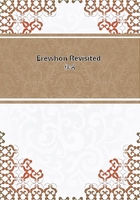
第36章
While he was in the flesh, was he more than a mere embryo growing towards birth into that life of the world to come in which he now shines so gloriously? What a small thing was that flesh and blood life, of which he was alone conscious, as compared with that fleshless life which he lives but knows not in the lives of millions, and which, had it ever been fully revealed even to his imagination, we may be sure that he could not have reached?'
"These were the Sunchild's words, as repeated to me by one of his chosen friends while he was yet amongst us. Which, then, of this man's two lives should we deem best worth having, if we could choose one or other, but not both? The felt or the unfelt? Who would not go cheerfully to block or stake if he knew that by doing so he could win such life as this poet lives, though he also knew that on having won it he could know no more about it? Does not this prove that in our heart of hearts we deem an unfelt life, in the heaven of men's loving thoughts, to be better worth having than any we can reasonably hope for and still feel?
"And the converse of this is true; many a man has unhesitatingly laid down his felt life to escape unfelt infamy in the hell of men's hatred and contempt. As body is the sacrament, or outward and visible sign, of mind; so is posterity the sacrament of those who live after death. Each is the mechanism through which the other becomes effective.
"I grant that many live but a short time when the breath is out of them. Few seeds germinate as compared with those that rot or are eaten, and most of this world's denizens are little more than still-born as regards the larger life, while none are immortal to the end of time. But the end of time is not worth considering; not a few live as many centuries as either they or we need think about, and surely the world, so far as we can guess its object, was made rather to be enjoyed than to last. 'Come and go' pervades all things of which we have knowledge, and if there was any provision made, it seems to have been for a short life and a merry one, with enough chance of extension beyond the grave to be worth trying for, rather than for the perpetuity even of the best and noblest.
"Granted, again, that few live after death as long or as fully as they had hoped to do, while many, when quick, can have had none but the faintest idea of the immortality that awaited them; it is nevertheless true that none are so still-born on death as not to enter into a life of some sort, however short and humble. A short life or a long one can no more be bargained for in the unseen world than in the seen; as, however, care on the part of parents can do much for the longer life and greater well-being of their offspring in this world, so the conduct of that offspring in this world does much both to secure for itself longer tenure of life in the next, and to determine whether that life shall be one of reward or punishment.
"'Reward or punishment,' some reader will perhaps exclaim; 'what mockery, when the essence of reward and punishment lies in their being felt by those who have earned them.' I can do nothing with those who either cry for the moon, or deny that it has two sides, on the ground that we can see but one. Here comes in faith, of which the Sunchild said, that though we can do little with it, we can do nothing without it. Faith does not consist, as some have falsely urged, in believing things on insufficient evidence; this is not faith, but faithlessness to all that we should hold most faithfully. Faith consists in holding that the instincts of the best men and women are in themselves an evidence which may not be set aside lightly; and the best men and women have ever held that death is better than dishonour, and desirable if honour is to be won thereby.